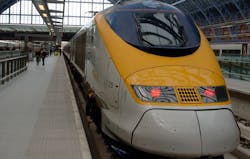Alstom is working with Eurostar to support the donation of two Eurostar power cars to the National College for High Speed Rail.
Alstom built the UK’s first high speed trains for Eurostar, the classic original e300/ Class 373 – or Trans-Manche Super Train (TMST) – which have carried over 160 million passengers between the UK and mainland Europe.
Following Eurostar’s decision to retire some of these hard-working vehicles, two of the power cars will be given to the National College for High Speed Rail in Doncaster and Birmingham. The two cars are being fully refurbished by Alstom.
The power cars are the first and last carriages in the Eurostar. They are the instantly recognisable ‘nose’ and ‘tail’ of the train that ran between Paris, Brussels and London.
The National College for High Speed Rail has two campuses, in Doncaster and Birmingham, and provides young people with the specialist training, skills and qualifications that are required to build HS2 and future rail projects.
The donation gives the students at the college, who are set to play a pivotal role in the development of HS2, the vital chance to study, in-depth, existing high-speed technology.
“HS2 will bring huge benefits to passengers, but even more crucial is the legacy of skills, apprenticeships and jobs it will create, all over the country. This is why Alstom and Eurostar are donating these two trains to the National College for High Speed Rail, which is set to play a crucial role in developing the skills necessary for the successful delivery of HS2,” said Jason Baldock, HS2 director at Alstom.
“We are very pleased that the power cars of two of our original Eurostar trains will play a key role in developing the skills and expertise of the rail engineers of the future. These iconic high speed trains were ground-breaking and have transformed travel between the UK and mainland Europe,” said Philippe Mouly, chief operating officer at Eurostar.
“This generous donation of two power cars allows us as a world-class college to offer our students the opportunity to develop real-life skills using industry-leading technology. Support like this is crucial for us to ensure that we can properly train and prepare the future workforce for the rail and infrastructure industries.
“We are very grateful for the support we have received so far from business and industry leaders. As an employer-led college, we are still keen to hear from employers wishing to show support in addressing the current engineering and rail skills gap. If you’d like to get involved and work with us to give our young people an insight into the opportunities in this industry, then please contact the college,” said Clair Mowbray, chief executive at the National College for High Speed Rail.
Working closely with the National College for High Speed Rail, Alstom is also building its own training academy in Widnes as part of a new technology centre in the region. The Alstom Academy for Rail will open in September 2017 and initially support 65 apprenticeship places.



